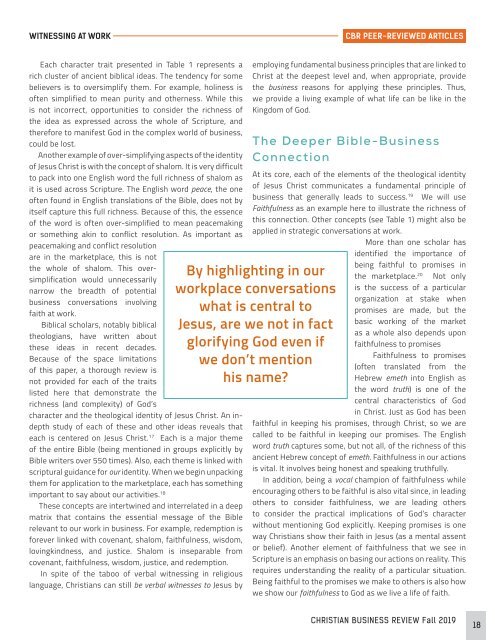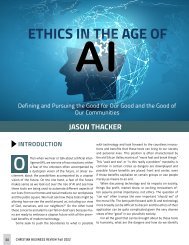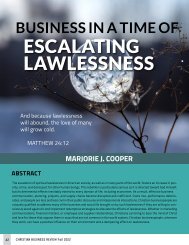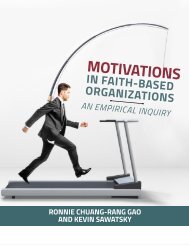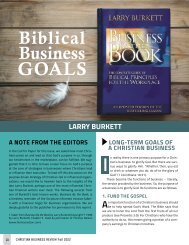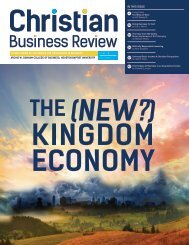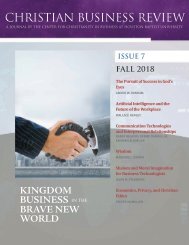Christian Business Review 2019: Workplace Practices That Glorify God (Issue 8)
You also want an ePaper? Increase the reach of your titles
YUMPU automatically turns print PDFs into web optimized ePapers that Google loves.
WITNESSING AT WORK<br />
CBR PEER-REVIEWED ARTICLES<br />
Each character trait presented in Table 1 represents a<br />
rich cluster of ancient biblical ideas. The tendency for some<br />
believers is to oversimplify them. For example, holiness is<br />
often simplified to mean purity and otherness. While this<br />
is not incorrect, opportunities to consider the richness of<br />
the idea as expressed across the whole of Scripture, and<br />
therefore to manifest <strong>God</strong> in the complex world of business,<br />
could be lost.<br />
Another example of over-simplifying aspects of the identity<br />
of Jesus Christ is with the concept of shalom. It is very difficult<br />
to pack into one English word the full richness of shalom as<br />
it is used across Scripture. The English word peace, the one<br />
often found in English translations of the Bible, does not by<br />
itself capture this full richness. Because of this, the essence<br />
of the word is often over-simplified to mean peacemaking<br />
or something akin to conflict resolution. As important as<br />
peacemaking and conflict resolution<br />
are in the marketplace, this is not<br />
the whole of shalom. This oversimplification<br />
would unnecessarily<br />
narrow the breadth of potential<br />
business conversations involving<br />
faith at work.<br />
Biblical scholars, notably biblical<br />
theologians, have written about<br />
these ideas in recent decades.<br />
Because of the space limitations<br />
of this paper, a thorough review is<br />
not provided for each of the traits<br />
listed here that demonstrate the<br />
richness (and complexity) of <strong>God</strong>’s<br />
character and the theological identity of Jesus Christ. An indepth<br />
study of each of these and other ideas reveals that<br />
each is centered on Jesus Christ. 17 Each is a major theme<br />
of the entire Bible (being mentioned in groups explicitly by<br />
Bible writers over 550 times). Also, each theme is linked with<br />
scriptural guidance for our identity. When we begin unpacking<br />
them for application to the marketplace, each has something<br />
important to say about our activities. 18<br />
These concepts are intertwined and interrelated in a deep<br />
matrix that contains the essential message of the Bible<br />
relevant to our work in business. For example, redemption is<br />
forever linked with covenant, shalom, faithfulness, wisdom,<br />
lovingkindness, and justice. Shalom is inseparable from<br />
covenant, faithfulness, wisdom, justice, and redemption.<br />
In spite of the taboo of verbal witnessing in religious<br />
language, <strong>Christian</strong>s can still be verbal witnesses to Jesus by<br />
employing fundamental business principles that are linked to<br />
Christ at the deepest level and, when appropriate, provide<br />
the business reasons for applying these principles. Thus,<br />
we provide a living example of what life can be like in the<br />
Kingdom of <strong>God</strong>.<br />
The Deeper Bible-<strong>Business</strong><br />
Connection<br />
At its core, each of the elements of the theological identity<br />
of Jesus Christ communicates a fundamental principle of<br />
business that generally leads to success. 19 We will use<br />
Faithfulness as an example here to illustrate the richness of<br />
this connection. Other concepts (see Table 1) might also be<br />
applied in strategic conversations at work.<br />
More than one scholar has<br />
identified the importance of<br />
being faithful to promises in<br />
the marketplace. 20 Not only<br />
is the success of a particular<br />
organization at stake when<br />
promises are made, but the<br />
basic working of the market<br />
as a whole also depends upon<br />
faithfulness to promises<br />
Faithfulness to promises<br />
(often translated from the<br />
Hebrew emeth into English as<br />
the word truth) is one of the<br />
central characteristics of <strong>God</strong><br />
in Christ. Just as <strong>God</strong> has been<br />
faithful in keeping his promises, through Christ, so we are<br />
called to be faithful in keeping our promises. The English<br />
word truth captures some, but not all, of the richness of this<br />
ancient Hebrew concept of emeth. Faithfulness in our actions<br />
is vital. It involves being honest and speaking truthfully.<br />
In addition, being a vocal champion of faithfulness while<br />
encouraging others to be faithful is also vital since, in leading<br />
others to consider faithfulness, we are leading others<br />
to consider the practical implications of <strong>God</strong>’s character<br />
without mentioning <strong>God</strong> explicitly. Keeping promises is one<br />
way <strong>Christian</strong>s show their faith in Jesus (as a mental assent<br />
or belief). Another element of faithfulness that we see in<br />
Scripture is an emphasis on basing our actions on reality. This<br />
requires understanding the reality of a particular situation.<br />
Being faithful to the promises we make to others is also how<br />
we show our faithfulness to <strong>God</strong> as we live a life of faith.<br />
By highlighting in our<br />
workplace conversations<br />
what is central to<br />
Jesus, are we not in fact<br />
glorifying <strong>God</strong> even if<br />
we don’t mention<br />
his name?<br />
CHRISTIAN BUSINESS REVIEW Fall <strong>2019</strong><br />
18 2


